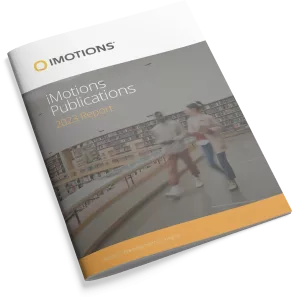-
Using Eye-Tracking to Understand Human Responses to Traditional Neighborhood Designs
New research in brain and cognitive science is changing how we understand how people perceive and experience the built environment, offering key opportunities for urban planning, urban design, and architecture. Sixty-three college students looked at different scenes of New York City public buildings in a set up with an eye tracker in front of a […]
-
Service with a smiley face: Emojional contagion in digitally mediated relationships
Abstract: The lack of typical nonverbal cues in digitally mediated marketing communication (e.g., text messages, social media etc.) creates special challenges for marketers desiring to manage customer relationships. To overcome these limitations, marketers have turned to emojis to convey subtle meaning regarding the message sender (often a service provider) and to elicit positive emotion in […]
-
A post-paradigmatic approach to analysing emotions in social life
Scholars studying emotions in social life typically work mono-logically, within a paradigmatic camp, drawing on distinct theories of emotion. In isolation, each offers a singular conceptualisation of emotions in social life. Working multi-logically, in contrast, offers richer, comparative insight into the layered meanings of emotion relevant to a social context. Rather than treating them as […]
-
Influences of sensory attribute intensity, emotional responses, and non-sensory factors on purchase intent toward mixed-vegetable juice products under informed tasting condition
Abstract: Product-related sensory and non-sensory cues have been studied in the past to understand purchase behavior among consumers. However, there has been little research related to integrating emotional responses with such cues to achieve better prediction of consumer purchase behavior. This study aimed to determine the impacts of sensory attribute intensities (SAI), non-sensory factors (NSF), […]
-
Neurophysiological Effects of Presence in Calm Virtual Environments
Presence, the feeling of being there, is an important factor that affects the overall experience of virtual reality. Presence is measured through post-experience subjective questionnaires. While questionnaires are a widely used method in human-based research, they suffer from participant biases, dishonest answers, and fatigue. In this paper, we measured the effects of different levels of […]
-
Does visual framing drive eye gaze behavior? The effects of visual framing of athletes in an increasingly visual social media world
Previous research on the effects of visual framing of athletes has inferred that photographic visual frames drive visual behavior by demonstrating that visual frames influence picture viewers’ evaluative ratings and memory for the pictures. This study uses eye-tracking methodology to ask if these previous findings are actually the result of visual frames driving eye gaze/visual […]
-
Between text and platforms: A case study on the real-time emotions and psychophysiological indicators of video gaming and academic engagement
Abstract: Literature indicates that both academic tasks (Deater-Deckard et al. 2013; Skinner et al. Educational and Psychological Measurement, 69(3): 493–525, 2009) and video gaming (Irwin The Journal of Psychology, 133, 157–164, 1999; Laffan et al. Computers in Human Behavior, 65, 544–549, 2016; Whitton Simulation & Gaming, 42(5), 596–609, 2011) have qualities that engage and captivate […]
-
Storytelling, the scale of persuasion and retention: A neuromarketing approach
Persuasive storytelling is an essential tool for propagandists, publicists, and corporations. In this research, storytelling styles have been examined for their effectiveness in terms of attitude change and retention. Two groups of respondents were asked to read two short, fictional texts about a chosen corporation’s positive action toward the environment. One story was written using […]
-
Multimodal Validation of Facial Expression Detection Software for Real-time Monitoring of Affect in Patients with Suicidal Intent
Abstract: Facial expression is an independent and objective marker of affect. Basic emotions (fear, sadness, joy, anger, disgust and surprise) have been shown to be universal across human cultures. Techniques such as the Facial Action Coding System can capture emotion with good reliability. Such techniques visually process the changes in different assemblies of facial muscles that produce […]
-
Impairments in face discrimination and emotion recognition are related to aging and cognitive dysfunctions in Parkinson’s disease with dementia
Patients with Parkinson’s disease (PD) suffer from motor and non-motor symptoms; 40% would develop dementia (PD-D). Impaired face and emotion processing in PD has been reported; however, the deficits of face processing in PD-D remain unclear. We investigated three essential aspects of face processing capacity in PD-D, and the associations between cognitive, neuropsychiatric assessments and […]
Research Report 2024
In-depth look at the scientific landscape as powered by iMotions software, showcasing groundbreaking research and the impact of our tools in various scientific and industrial fields.
iMotions Science Resources
Looking for white papers, validation reports or research show casing iMotions Multimodal capabilities?
Share Your Research

850+ universities worldwide with an iMotions human behavior lab
73 of the top 100 highest ranked universities
710+ published research papers using iMotions
iMotions is used for some of the most interesting human behavior research studies carried out by top researchers around the world. Contact us to have your publication featured here.
The authors of these publications have used iMotions as a software tool within their research.
“Software should be cited on the same basis as any other research product such as a paper or a book; that is, authors should cite the appropriate set of software products just as they cite the appropriate set of papers” (Katz et al., 2020).
We therefore encourage you to cite the use of iMotions where appropriate.
How to cite iMotions
APA
iMotions (10), iMotions A/S, Copenhagen, Denmark, (2024).
Note: adjust the version and year where relevant.
5 Most Popular Blogs
Learn How to Conduct Human Behavior Research with iMotions
Publications
Read publications made possible with iMotions
Blog
Get inspired and learn more from our expert content writers
Newsletter
A monthly close up of latest product and research news




